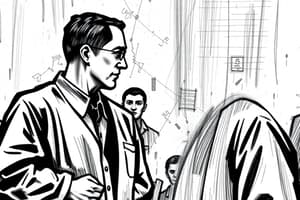Podcast
Questions and Answers
What is social control?
What is social control?
Social control refers generally to societal and political mechanisms or processes that regulate individual and group behavior, leading to conformity and compliance to the rules of a given society, state, or social group.
What are some of the agencies that control your behavior? (Select all that apply)
What are some of the agencies that control your behavior? (Select all that apply)
- Religious beliefs (correct)
- Work and careers (correct)
- Peer groups (correct)
- Police (correct)
- Education (correct)
- Media (correct)
- Family (correct)
What is internal social control?
What is internal social control?
The process of internalizing the norms of society and accepting them as valid, operating through socialization to encourage conformity.
What is external social control?
What is external social control?
How may theories link to the proper socialization of norms and values? (Select all that apply)
How may theories link to the proper socialization of norms and values? (Select all that apply)
What are the two types of socialization?
What are the two types of socialization?
What is rational ideology?
What is rational ideology?
How do right realists support rational ideology?
How do right realists support rational ideology?
What role do traditions play in social control?
What role do traditions play in social control?
Give examples of external formal and informal social control.
Give examples of external formal and informal social control.
What does coercion mean?
What does coercion mean?
Why might prison, fines, death penalty, community sentences, and ASBOs be seen as effective or ineffective at controlling behavior?
Why might prison, fines, death penalty, community sentences, and ASBOs be seen as effective or ineffective at controlling behavior?
What is social control theory?
What is social control theory?
What does attachment mean in the context of social control?
What does attachment mean in the context of social control?
How does opportunity affect conformity?
How does opportunity affect conformity?
What is the significance of involvement in legitimate activities?
What is the significance of involvement in legitimate activities?
What role does belief play in social control?
What role does belief play in social control?
What is neutralization theory?
What is neutralization theory?
What are the five techniques of neutralization?
What are the five techniques of neutralization?
What characteristics might criminals have regarding family relationships?
What characteristics might criminals have regarding family relationships?
How did Josef Fritzl attempt to neutralize his behavior?
How did Josef Fritzl attempt to neutralize his behavior?
Flashcards are hidden until you start studying
Study Notes
Social Control Overview
- Social control regulates individual and group behavior within society, promoting conformity to societal norms.
Agencies of Social Control
- Key agencies influencing behavior include police, peer groups, education systems, media, family, religious institutions, and workplaces.
Internal Social Control
- Internalization of societal norms occurs through socialization, leading to conformity.
- Relationships and moral codes reduce the likelihood of deviant behavior; family plays a crucial role in this internal understanding of right and wrong.
External Social Control
- Society employs rewards and punishments to ensure conformity, categorized as positive sanctions (rewards) and negative sanctions (punishments).
- Authorities, such as police, employ coercive measures to maintain obedience and compliance.
Theories Linking Socialization to Behavior
- Various theories (Behaviorist, Freud, Functionalism, Right Realism) connect effective socialization of norms and values to behavioral control.
Types of Socialization
- Primary socialization occurs from ages 0-5, primarily through families.
- Secondary socialization continues throughout life, involving education, peers, and broader societal norms.
Rational Ideology
- An ideology comprises shared beliefs that shape an individual's worldview, influencing their adherence to laws and norms.
- Extreme ideologies can sometimes justify criminal behavior; Marxist perspectives criticize capitalism for perpetuating inequality.
Right Realism & Rational Choice Theory
- Right Realists emphasize Rational Choice Theory, suggesting individuals weigh risks and rewards, influencing their decision-making and moral outlook.
Traditions as Internal Control
- Family or cultural traditions function as internal controls, creating norms that discourage deviance, with potential consequences like exclusion or shame.
Examples of Social Control
- Formal social control involves official institutions (e.g., police, government).
- Informal social control relies on unofficial community figures (e.g., neighborhood watch, street pastors).
Coercion
- Coercion employs force to compel compliance, considered a last resort in social control.
Effectiveness of Penal Measures
- Prisons can rehabilitate but face high recidivism rates (44% within one year).
- Fines deter but may not impact wealthier individuals; non-payment rates are high.
- Death penalty serves as a strong deterrent, though its application varies globally.
- Community sentences are perceived as lenient and do not always reduce recidivism; ASBOs can lead to stigma among young offenders.
Social Control Theory
- Hirschi’s theory states that weak social bonds lead to delinquency, emphasizing four types of social control that strengthen bonds.
Components of Social Control
- Attachment: Strong family and peer relationships encourage conformity.
- Opportunity: Belief in a legitimate future curbs deviant behavior.
- Involvement: Engagement in positive activities hinders deviance.
- Belief: Strong adherence to societal morals restricts deviant impulses.
Neutralization Theory
- Sykes and Matza explain that individuals rationalize deviant behavior through neutralization techniques that weaken moral commitments.
Techniques of Neutralization
- Denial of responsibility: Attributing deviant actions to external circumstances.
- Denial of harm: Minimizing the impact of one’s actions on others.
- Condemning the condemners: Justifying actions by criticizing societal norms.
Criminal Behavior & Family Relations
- Weak family bonds are linked to criminality; for instance, serial killers like Jeffrey Dahmer had troubled family relationships.
Josef Fritzl Case
- Fritzl rationalized his actions, believing he protected his daughter, illustrating the complexity of moral justification amidst deviance.
Studying That Suits You
Use AI to generate personalized quizzes and flashcards to suit your learning preferences.




